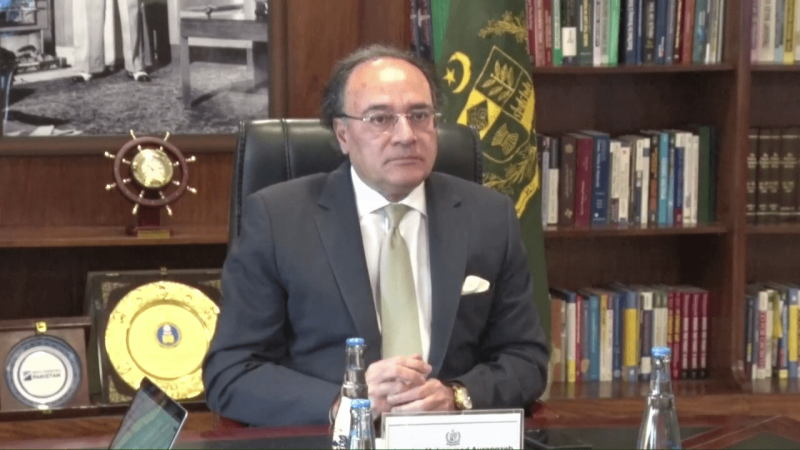Finance Minister Muhammad Aurangzeb credited strict financial discipline and robust coordination between the federal and provincial governments for enabling the achievement of a primary surplus, according to a Finance Ministry statement released on Friday.
Last November, unprecedented profits by the State Bank of Pakistan, driven by the highest-ever interest rates and record petroleum levy revenue — both non-tax sources — have helped the country convert its entrenched budget deficits into a fiscal surplus for the first time in at least 24 years.
The finance minister “credited strict financial discipline and robust coordination between the federal and provincial governments for enabling the achievement of a primary surplus,” the statement said.
Aurangzeb, along with his team, held a Zoom meeting today with representatives of S&P Global Ratings as part of the ongoing Pakistan Sovereign Ratings Review, the statement added.
“During the session, the finance minister presented a detailed overview of the government’s macroeconomic reform agenda and reaffirmed Pakistan’s commitment to achieving sustainable and inclusive economic growth by enhancing productivity and promoting exports, the statement continued.”
He emphasised the continuity of reforms across key sectors, including taxation, energy, state-owned enterprises (SOEs), privatisation, public finance management, rightsizing of government functions, and more active debt management strategies.
The finance minister noted that inflation and the current account deficit (CAD) had remained on a positive note throughout the year, contributing positively to overall economic stability.
“He also highlighted the achievement of surpluses in both the primary balance and the current account as major milestones, underscoring the improving fundamentals of Pakistan’s economy,” the statement read.
“He stated that the country’s external portfolio was well-managed, with foreign exchange reserves projected to reach $14 billion by the end of June, supported by upcoming institutional and trade inflows, strong remittances, and easing oil prices, all of which are helping reduce pressure on the external account,” the statement quoted the finance minister as saying.
Aurangzeb pointed to significant institutional reforms, including the signing of a comprehensive National Fiscal Pact, operationalisation of the National Tax Council, and the imposition of agricultural income tax, reflecting a whole-of-government approach and a shared national resolve to improve resource efficiency, broaden the tax base, and ensure long-term inclusive growth.
He further stated that the tax-to-GDP ratio was expected to reach 10.6 per cent by the end of June, which would mark progress toward the government’s target of raising it to 13pc by the conclusion of the 37-month Extended Fund Facility (EFF) with the International Monetary Fund (IMF).
He added that the separation of the Tax Policy Office from the Federal Board of Revenue (FBR) was part of a broader effort to align tax policymaking with economic value principles rather than administrative convenience.
The finance minister also shared insights from his recent visit to the United States for the World Bank and IMF Spring Meetings, during which he held over 70 meetings in six days with counterparts, Development Finance Institutions (DFIs), investment banks, multilateral and bilateral partners, rating agencies, think tanks, and media outlets, according to the Finance Ministry.
He conveyed that the feedback received from these stakeholders consistently reflected appreciation and support for the structural reforms and macroeconomic stability achieved by Pakistan over the past 14 months.
“At the same time, there was a strong and unified recommendation for Pakistan to stay the course, deepen the reform momentum, and focus on embedding permanence in macroeconomic stability, with international partners expressing readiness to support the country in achieving these objectives,” the statement concluded.
Earlier in the week, Aurangzeb expressed confidence that the global situation following the imposition of US tariffs is manageable for Pakistan.
The minister, speaking at the leadership of the business community during his visit to the Federation of Pakistan Chambers of Commerce and Industry (FPCCI) in Karachi, said Pakistan already has constructive engagements with US authorities on the sidelines of World Bank and IMF summer meetings, while the premier has also announced the decision to send a delegation to the US to negotiate tariff issues.
Last month, global ratings agency Fitch had upgraded Pakistan’s foreign currency credit rating to ‘B-’ from ‘CCC+’, citing increased confidence in the country’s progress on narrowing its budget deficits.
The upgrade also reflects confidence that the country would implement structural reforms, supporting its International Monetary Fund (IMF) programme performance and funding availability, Fitch had said.


